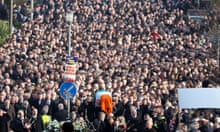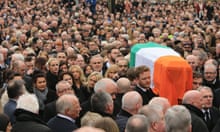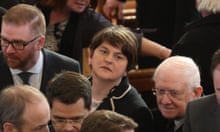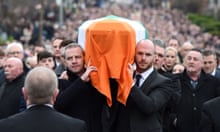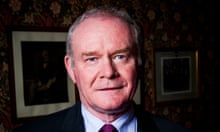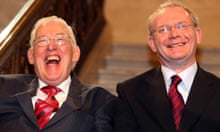World leaders, old allies and new political colleagues have expressed sorrow at the death of Martin McGuinness, whose journey from IRA chief of staff to Stormont’s deputy first minister personified the Northern Ireland peace process.
McGuinness died overnight on Tuesday after a short illness. The 66-year-old was surrounded by his family in Derry’s Altnagelvin hospital. He had been suffering from a rare genetic disease caused by deposits of abnormal protein – amyloid – in tissues and vital organs including the heart.
Later the same day several hundred mourners walked behind his tricolour-draped coffin as it made its way through the republican Bogside district – the area where the Troubles began in the late 1960s when the unionist-dominated Stormont sought to violently suppress the Northern Ireland civil rights movement.
Some of his opponents and those affected by IRA violence continued to find the idea that he had changed impossible to believe and reacted angrily at the response to his death. But many modern-day unionists joined the tributes to the former IRA commander, Sinn Féin chief negotiator during the peace process, and deputy first minister from 2007 until his resignation in January.
McGuinness’s closest ally in the republican movement, the Sinn Féin president, Gerry Adams, had confirmed McGuinness’s death on Tuesday. He later spent an hour at the family’s home and helped carry his friend’s coffin during the procession.
“Martin, as we all know, was a very passionate Irish republican. He believed in our people – that people of this island should be free. He believed in reconciliation. He worked very, very hard at all of that,” Adams said. “We are very, very sad that we lost him overnight.”
To many, McGuinness was seen as a peacemaker, a man who, having once argued that the British presence in Ireland could only be ended by armed struggle, became a passionate believer in compromise with the unionist community.
But some still regard him primarily as a key figure in the IRA terrorist group that killed almost 1,800 people before Sinn Féin, its political wing, embraced the compromises its peaceful rivals in the Social Democratic and Labour party had articulated from the 1960s onwards.
McGuinness’s remarkable journey from the “armed struggle” to peaceful compromise with unionism was encapsulated in his relationship as deputy first minister with the late former first minister the Rev Ian Paisley. It was also captured in several warm encounters McGuinness had with the Queen from 2012 onwards.
Buckingham Palace confirmed the Queen would send a private message of condolence to McGuinness’s widow, Bernie, his sons Fiachra and Emmett, daughters Grainne and Fionnuala, and his grandchildren.
Paisley’s family spoke fondly of McGuinness’s relations with their father when the pair served together in a political arrangement nicknamed “The Chuckle Brothers” because their constant smiling camaraderie reminded people of the characters in the BBC children’s TV comedy.
Paisley’s son Kyle, who is a Free Presbyterian minister, tweeted:
1/2 Very sorry to hear about the passing of Martin McGuinness.Look back with pleasure on the remarkable year he and my father...
— Kyle Paisley (@JCKP1966) March 21, 2017
2/2 spent in office together and the great good they did together. Will never forget his ongoing care for my father in his ill health.
— Kyle Paisley (@JCKP1966) March 21, 2017
But others could not accept the idea that McGuinness had transformed from man of war to man of peace.
Norman Tebbit, the Conservative cabinet minister who was injured and whose wife was left permanently disabled in the IRA’s 1984 Brighton bombing, called him “a coward who never atoned for his crimes” and said “there can be no forgiveness without a confession of sins”.

Stephen Gault, whose father, Samuel, died in the IRA’s notorious “Poppy Day” bombing in Enniskillen in 1987, said he would remember McGuinness only as a terrorist. “If he had been repentant my thoughts might have been slightly different,” he said. “But he took to his grave proud that he served in the IRA.”
On the world stage the tone was different. Political leaders past and present praised McGuinness for his key role in creating arguably the world’s most successful peace process.
Bill Clinton, the US president who directly intervened to urge all of the Northern Ireland parties to reach a historic compromise in the 1998 Good Friday agreement paid tribute to McGuinness.
“He believed in a shared future, and refused to live in the past, a lesson all of us who remain should learn and live by. May he rest in peace,” Clinton said.
Tony Blair, who was British prime minister during the Good Friday negotiations, acknowledged that those who lost loved ones would be unable to forget the past.
But he added: “Once he became the peacemaker, he became it wholeheartedly and with no shortage of determined opposition to those who wanted to carry on the war. I will remember him therefore with immense gratitude for the part he played in the peace process, and with genuine affection for the man I came to know and admire for his contribution to peace.”
Theresa May joined in the tributes but said McGuinness had initially chosen the wrong violent path.
“While I can never condone the path he took in the earlier part of his life, Martin McGuinness ultimately played a defining role in leading the republican movement away from violence. In doing so, he made an essential and historic contribution to the extraordinary journey of Northern Ireland from conflict to peace,” the prime minister said.
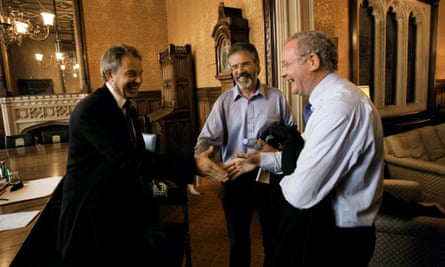
The Irish president, Michael D Higgins, said: “The world of politics and the people across this island will miss the leadership he gave, shown most clearly during the difficult times of the peace process, and his commitment to the values of genuine democracy that he demonstrated in the development of the institutions in Northern Ireland.”
McGuinness resigned from office in January appearing physically frail, which prompted fears he was gravely ill. He stood down from the post in protest at the refusal of the last first minister and Democratic Unionist leader, Arlene Foster, to temporarily move aside while a public inquiry was held into a botched green energy scheme estimated to have cost the public purse half a billion pounds.
Putting aside their falling out which triggered the collapse of the power-sharing government in Belfast and a bitterly divisive assembly election, Foster said of McGuinness: “He was pivotal in bringing the republican movement towards a position of using peaceful and democratic means.”

Married with four children, McGuinness was the IRA’s chief of staff from 1979 to 1982 and ran the paramilitary movement when Lord Mountbatten and 18 British soldiers were killed on the same day.
Yet just over a decade after those atrocities McGuinness was secretly holding talks with British government representatives with the aim of bringing the IRA’s armed campaign to an end.
Alongside Gerry Adams, McGuinness courted Tony Blair from the moment the Labour leader won his landslide election in May 1997.
Back in his native Derry on Tuesday afternoon, beyond the debates over his legacy and the reaction from politicians worldwide to his death, there was a poignant family scene as McGuinness’s coffin was carried towards his home.
His wife Bernie and their children wept and held on to one another as they walked behind the coffin.
His funeral will take place in Derry at 2pm on Thursday.
